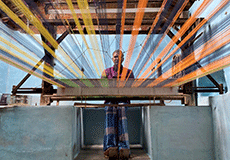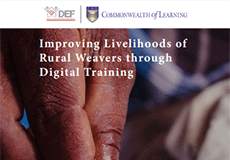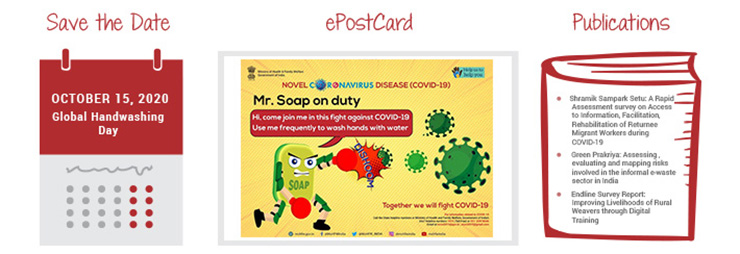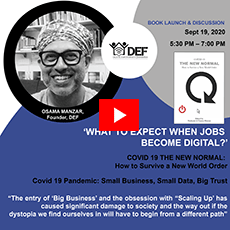


When the coronavirus pandemic set in and a rigid lockdown brought life to a standstill across India, millions of migrant workers left cities and headed back to their villages to be with their families. They carried with them their sparse belongings in small suitcases and backpacks, but their most valued possession was always kept at hand — a cheap mobile phone with prepaid talk time. The mobile phone was their only link with the rest of the world and particularly their families, waiting anxiously for them to return as they walked down highways and across fields and waded through rivers to sneak across state borders. But soon keeping the phones functioning became a challenge in itself. There was nowhere to recharge fading batteries and no money to top up talk time. Of some 12,000 people walking from New Delhi to Bundelkhand, 2,000 made calls to a toll-free number on which they had learnt they could find help. The toll-free number was provided by Jan Sahas Social Development Society, a non-profit, which wanted to help migrants taking challenging routes find directions, shelter or local help. But the calls received by volunteers at Jan Sahas were invariably about connectivity. Read More






Smartpur’s efforts in the area of education have been implemented to address the problem of inadequate and unaffordable access to quality educational resources at the village level. Even in existing times like COVID-19, our Digital Warriors are putting communities first and dedicating their time to uplift them. One such exceptional Digital Warrior is Santosh. From providing training on digital tools, to helping students with access to internet for online classes, he is working to make sure that no child’s education suffers amid the pandemic. Santosh is also counselling children and their parents about future educational opportunities, especially to those who have no means of awareness to make a better future. “Education will empower future generations and right now my only aim is to remove all barriers stopping the children to reach their potential.”

The USIPI Digital Resource Centre in Alwar, Barmer district in Rajasthan, organised a Covid-19 Awareness Camp, soon after some relaxation in the lockdown rules. The aim of the camp was to register more beneficiaries under the Ann Yojana and Pradhan Mantri Kissan Samaan Nidhi initiative, to help them avail the scheme and sustain themselves. With various government policies announced for the vulnerable amid the lockdown, they had no means to avail it due to lack of documents and other issues. The Covid-19 Awareness Camp aimed to resolve this by helping people with the paperwork and raise awareness about the schemes and ways to avail it. It saw a huge attendance with all safety regulations in place, including social distancing and people wearing masks.


A farmer from Murpa in Jharkhand, Rajkapur Mahto bought a smartphone thinking his life would become easy. Post the purchase he realised that his illiteracy acted as a huge wall between him and the benefits he had imagined to reap. Soon he connected with our Samarth SoochnaPreneur (SSP) and got to know about Google Assistant, thus bringing him closer to digital literacy through voice command. Mahto learnt the features of the tool and now uses it on an everyday basis. From searching about the weather report, seeking farming related information to using Google lens or the Interpreter mode, he is able to leverage the platform to his benefit. Read More

Functional Literacy Program is an initiative of lndia@75 Foundation which aims on imparting digitised content comprising of basic digital and financial literacy. This in turn will increase life skills and employability amid the economically weaker sections (EWS) living in urban areas. The initiative is under process across seven locations - Almora, Delhi, Ghazipur, Guna, Ranchi, Raigarh and Tehri. The projects will directly benefit more than 1600 community members from age group 14+ to 45 years. Another important focus will be towards finding and supporting individuals affected by Covid-19. During such challenging times of the coronavirus pandemic, implementation of the programme... Read More

The Risk Communication and Community Engagement (RCCE) initiative aims to reach out to vulnerable and marginalised community members with Covid-19 specific information on preventive awareness and de-stigmatisation. Ongoing in almost 500 centers across 16 states, including 69 districts, it revolves around the themes of Covid-19 Appropriate Behavior (Prevention and Practices; and Stigma and Discrimination), Covid-19 Sensitive Health and Covid-19 Sensitive Nutrition. The objective of the initiative is to mitigate the stigma and discriminatory rumors and increase awareness, knowledge, and understanding of people. It also informs and trains people in terms of preparedness, prevention... Read More

DEF’s implementation of STEM for Girls classes has witnessed support and love from not just students but also their families. Sarayu is a student of 8th standard in a school in Telangana’s Yerrupalem area. She, along with her sister Sayura, is enrolled with the program. The entire family follows the class, especially their father Srinivas, ever since its shift to online mode due to the pandemic. Srinivas said, “After the STEM classes shifted online, I would watch my daughters attend the class and practice the experiments. I realised that the classes are developing their critical-thinking and analytic mindset along with giving them a sense of accomplishment and joy. Read More


Champe Khan was struggling to sustain himself and his elderly parents living in Baytu, in Rajasthan’s Barmer district. A differently-abled person from a poor family, Khan had been facing discrimination and other hardships all his life. He had been unable to avail the government’s Disability Pension due to lack of awareness and documents. DEF’s Samarth SoochnaPreneur (SSP) Narpat Balwan came across Khan and his family during a field visit and immediately started helping them out. SSP Balwan managed to apply for Khan’s Disability Certificate, required to avail the pension, by getting all the necessary documents made. Read More


About five kilometres from Tamil Nadu’s Musiri, a famous weaver cluster, is a small village in the district of Trichy called Manamedu. At its heart is a computer centre equipped with everything required to digitally enable the community’s weavers. An initiative of Digital Empowerment Foundation (DEF) and Mphasis, the center is a part of the network of rural entrepreneurs aiming to digitally empower the marginalised community of Trichy weavers. Upon entering the compound, one can see an ongoing training as some girls work on the sewing machines to the left. With a workshop like format, the girls receive practice and information on using ICT tools for creating new designs and setting up own business. Read More


The Research and Advocacy department of Digital Empowerment Foundation produced a report on ‘Improving Livelihoods of Rural Weavers through Digital Training’ based on training provided by DEF and Commonwealth of Learning to 2000 weavers and artisans across 8 states – Andhra Pradesh (Prakasam), Karnataka (Chamrajanagar), Madhya Pradesh (Ashok Nagar), Odisha (Bargarh, Cuttack), Rajasthan (Barmer), Tamil Nadu (Kanchipuram, Trichy), Uttar Pradesh (Barabanki) and West Bengal (Murshidabad). The training provided knowledge of ICT tools and critical digital skills to the artisan and weaver community during the COVID-19 pandemic. Read More




Research and Advocacy Manager
Digital Empowerment Foundation

Case 1: August 20th, At least 27% students do not have access to smartphones, laptops for online classes: NCERT survey.
Approximately 27 per cent of the students mentioned the non-availability of smartphones and laptops. The maximum number of stakeholders have opted for mobile phones as a medium for teaching-learning during the COVID-19 period,” the survey by the National Council of Educational Research and Training (NCERT) said.Read More

The Martalli Grama Panchayat in Kollegal, Karnataka had been facing connectivity issues. They were also unable to finish any documentation work regarding MNREGA, thereby bringing a halt to the lives of many workers under the scheme. They reached out to our Smartpur team in Kollegal – Palanimedu Spoke Center- for internet services and assistance. Our covid warriors, following strict guidelines from the government, visited the place and provided services. The staff also visited MNREGA workers on the job and disseminated information on COVID19, importance of maintaining physical distancing, using sanitizer and wearing masks. Mr. Arjun, the Spoke Coordinator has been working night and day since March to complete MNREGA documentation and other paper work to help Martalli Gram Panchayat. In service till today, Arjun has finished 191 job card renewals, issues 759 new job cards, filled 20 role attendance, completed payments for 38 MNREGA workers and 20 job allocations. Read More
House No. 44, 3rd Floor, Kalu Sarai, New Delhi | def@defindia.net | www.defindia.org | +91-11-26532786



